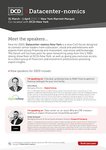Ahead of the Datacenter-nomics CxO Summit on data center investment & financial engineering at DCD>New York, 365 Data Centers' CEO Bob DeSantis, sat down for a Q&A with DCD's Kisandka Moses, who is producing this year's event, to discuss the company's M&A activity.
Q: When entering an acquisition, what advice would you give to the buy-side as they enter into negotiation?
A: The most important advice I can give the buy-side is threefold: be disciplined and consistent in making certain product strategy of the target company is complementary to the values of the acquirer; be disciplined with regards to the purchase price that you're willing to pay for the target; and conduct prudent due diligence balancing practicality with not leaving stones unturned because those unturned stones could lead to unexpected liabilities and the inability to meet objectives with regard to the target’s performance. It is critical to be consistent in the positions you take when dealing with the seller and the seller’s advisors. All successful transactions come down to integrity, trust, and consistency.
More on Datacenter-nomics
-

Datacenter-nomics New York Industry Interviews
Colo CEO's from Aligned Energy, RagingWire, Stack Infrastructure & Digital Realty talk to DCD's Peter Judge
-

-

Datacenter-nomics New York: Meet The Speakers
See the expert speakers sharing their insights at the inaugural CxO summit at DCD>New York
Q: How do you view investment opportunities in today's market? Do you see any tailwinds ahead for owners of colocation facilities?
A: I think there continues to be abundant opportunities for acquisitions of either single location or regional colocation operators. Generally, private owners of these types of facilities do not have the financial capability to continue to expand to other geographies, nor have the management of depth to broaden that footprint. Those operators realize they're going to hit a ceiling in terms of valuation, unless they're part of something bigger. That environment has been a good opportunity for acquirers for at least a decade.
There have been some differences over the last 3-5 years. Network-centric colocation facilities have become more and more valuable because of cloud offerings and virtual offerings. An edge data center with great connectivity to the public cloud has become very attractive to investors and more businesses like that have come to market because to realize the value those operators have built.
At this stage, multi-site colocation operators with their own networks are attractive targets for 365 Data Centers because that's how we built our business model. We try to either acquire the single-site operators or those that have a very nice network component that we can easily integrate and synergize into our business and product set.
Q: With the additional growth finance which 365 Data Centers secured last year, are any plans for further acquisitions in the near future? Are Sale-Leasebacks an Option?
A: Our first two acquisitions provided our initial equity investors with a platform which the 365 Data Centers management team transformed into a highly competitive, customer-focused and scalable business. Putting that effort into those early acquisitions enabled the company to secure a significant amount of committed growth capital. That growth capital came in the form of both significant delay draw components of our credit facility and equity capital from our newest equity partner. With the committed growth capital in place, we recently funded an acquisition of a very nice data center in Central New Jersey, strategically located between our Philadelphia and our New York facility, and soon will announce the acquisition of our 12th strategically located data center.
As far as sale-leaseback options, it's always a viable option with us, although the decision is dependent on the value of the asset being acquired and making sure a substantial long term anchor tenant is in place. There must also be room for both revenue and EBITDA growth within that facility without the need for extensive CAPEX because the purchase price serves as the primary investment for that asset.
Q: The majority of your facilities are located on the East Coast and the Midwest, but you don’t currently have any facilities in Northern Virginia. What is your perspective of the market in Northern Virginia? Do you think that there is any risk of saturation?
A: We've been disciplined in being a business that is focused on Chicago and East. We've developed a very nice presence in Florida and have the largest edge market coverage in that State with data centers and PoPs in Tampa, Orlando, Jacksonville, Boca Raton, Fort Lauderdale, and Miami. We’re also serving Nashville which is the fastest-growing market in the Southeast.
We have an interest in continuing to build our presence in the North East quadrant of the United States particularly in the data-intensive northeast corridor. Our North East quadrant footprint includes Chicago, Indianapolis, and Detroit and then across to Buffalo and down into New York City, Central Jersey, and Philadelphia.
We are a network-centric, edge market-focused business and some might define the Northern Virginia corridor as non-edge because it is so saturated and not conducive to an operator having a unique presence. With that said, if a disciplined M&A approach generates the right opportunity in that market, we certainly see the value of a network-centric data center in that market. We currently operate a PoP in Ashburn. We focus primarily on carrier, content, and retail enterprise customers. Most Northern Virginia operators focus solely on wholesale opportunities and wholesale enterprise customers.
Q: Given that the enterprise sector is a very strong focus for 365 Data Centers, are there any additional markets that you might be interested in expanding into?
A: Certainly, in the North East quadrant we would consider looking at opportunities throughout Pennsylvania, Ohio, and Massachusetts where we don't have facilities.
In the Southeast, there is more we could do in Florida and in the Tennessee markets which we find to be very good business environments.
Q: What factors make a market attractive to an owner of a colocation facility? There's a lot of very obvious plays from different states and counties offering cutbacks in sales tax and different incentives to provide owners with cheap land or power. Ultimately, do these incentives have any bearing on the decision that you make?
A: Speaking generally for the industry, tax, power, and land incentives are all critical because the major costs in our business are real estate, power, connectivity, and talent. However, we have a different focus as we don't look at greenfield builds as part of our strategy. Our strategy from the beginning was to acquire platform businesses that were in markets that we thought had not been fully taken advantage of by the prior operators of the businesses we acquired. When we are looking at an acquisition strategy in terms of market, we are looking at how well those businesses have done in terms of their ability to penetrate the market, so we look closely at the region’s overall IT spend.
One of the reasons we have the northeast corridor in our geographic strategy is because we focus on data and network-intensive markets. As data storage and transport exponentially grow, operators that are positioned in these markets will enhance franchise value.
We also take into account, as we did with our original platform and add on acquisitions, limited product sets offered by prior ownership when we know that we can add on other services, predominantly managed services. In our business we not only provide colocation but also a full menu of network and cloud services. We can zero in on an operator who is only providing colocation services, knowing that they are present in a market that has a strong segment of small and medium-sized enterprises that are looking for the managed services that the operator may not have provided, as we can very quickly overlay our services.
Q: You will be speaking on a panel within our Datacenter-Nomics program, focusing on optimal financing strategies for owners of colocation facilities. Besides the lender, who should a data center owner consult for advice on deal structuring?
A: There are a lot of important parties but I think it all starts with the ownership group. In our case, where we are a private company, it's the concurrence of the ownership group as to the objectives of financing. These could include maintaining and expanding lender relationships, the sizing of the facility, and the impact on the overall capital structure. It is also important to have a group of lenders that the arranging lender works well with and has a direct relationship with the Company that enables the borrower to in addition to the ability to continue to earn the lender group’s support through successful dealings and a transparent financing process.
Additionally, having counsel that is familiar with current debt market conditions in terms of provisions of credit agreements might seem like a basic requirement but it can be more than that, particularly if you have a counsel who understands your business and how it has been structured, and can be a strong advocate to achieve your financing objectives.
Beyond that, there could be new elements of financing which come about. If the borrower is required to have an audit of the financial statements, a talented audit partner who can speak to the accounting or tax treatment of new aspects of credit agreements is helpful to have during deal structuring.
Bob will join us at Datacenter-nomics at DCD>New York on March 31, to share his insights into “Club deal, syndicated loan or M&A? How to optimize financing strategies for your next facility.”

